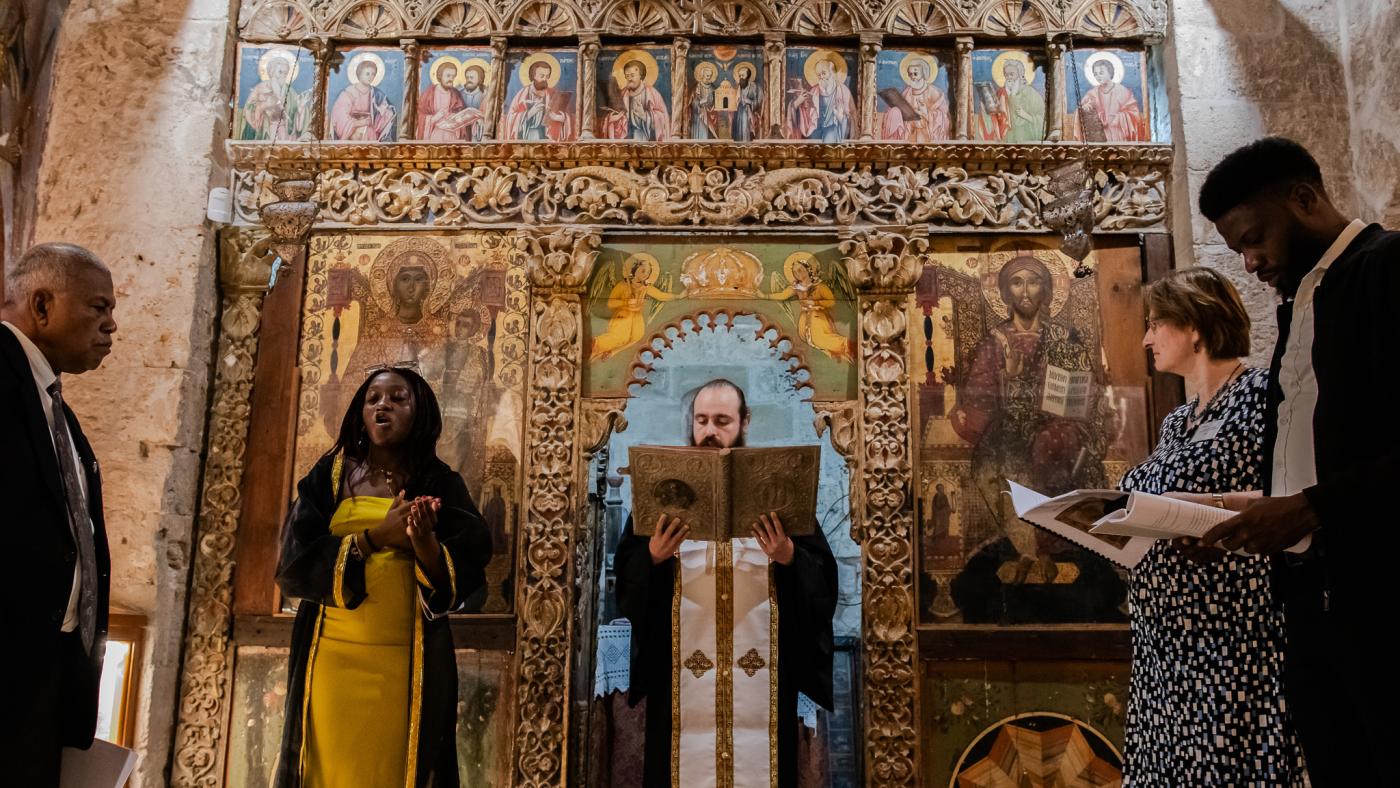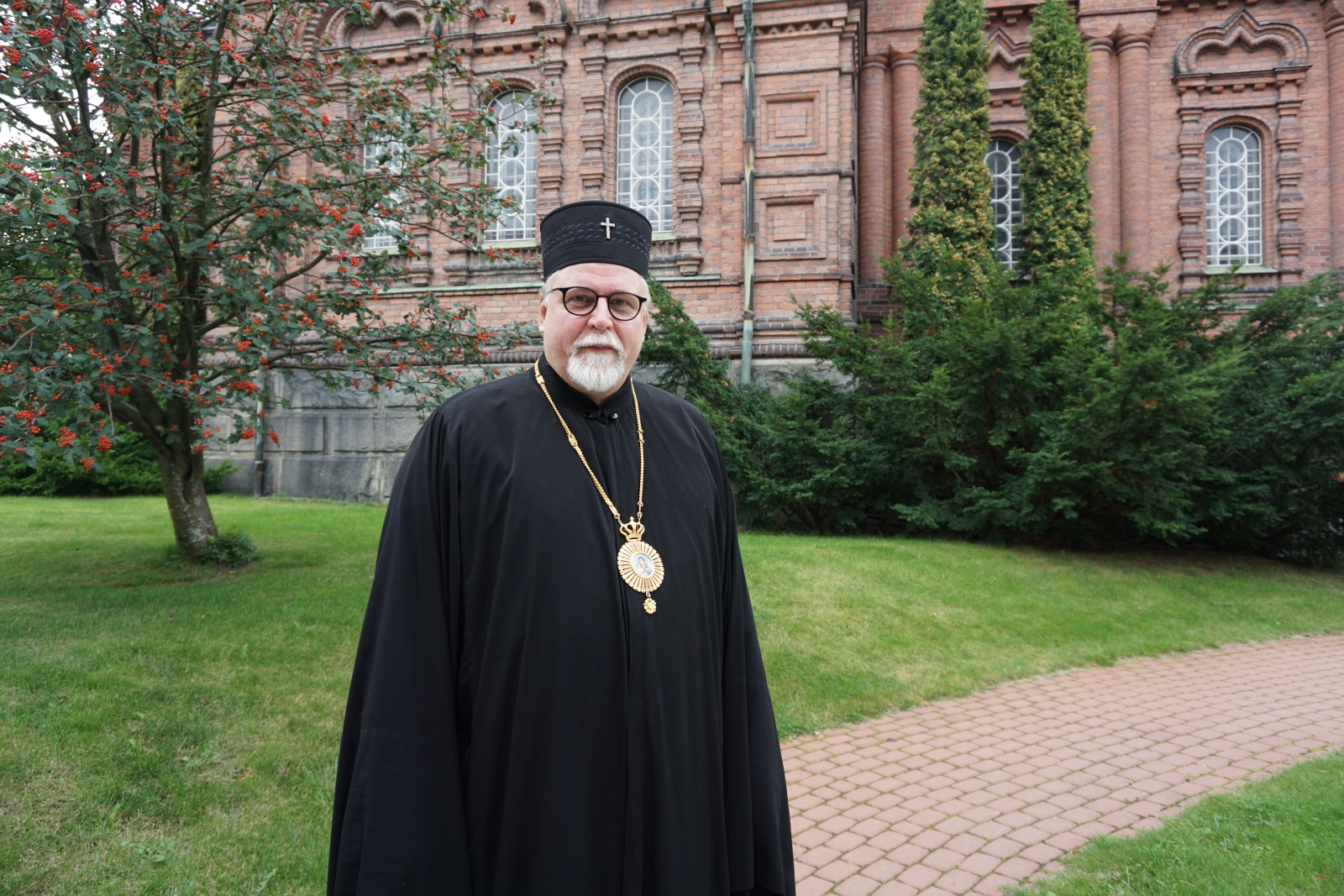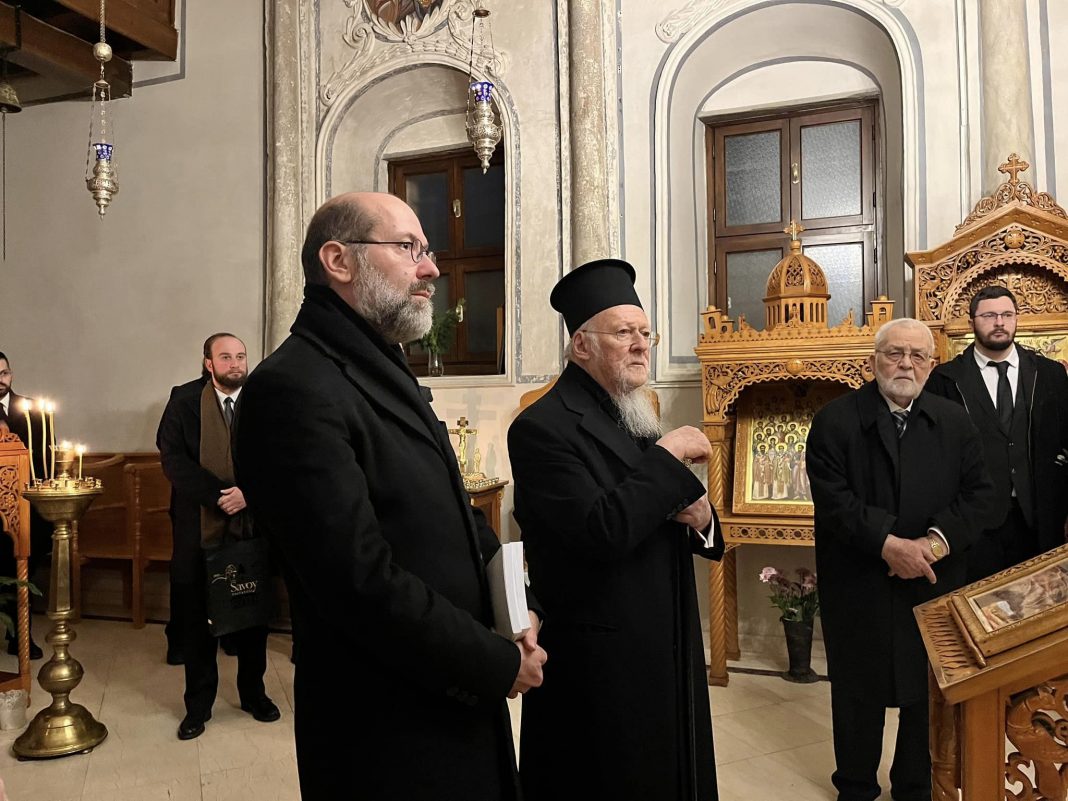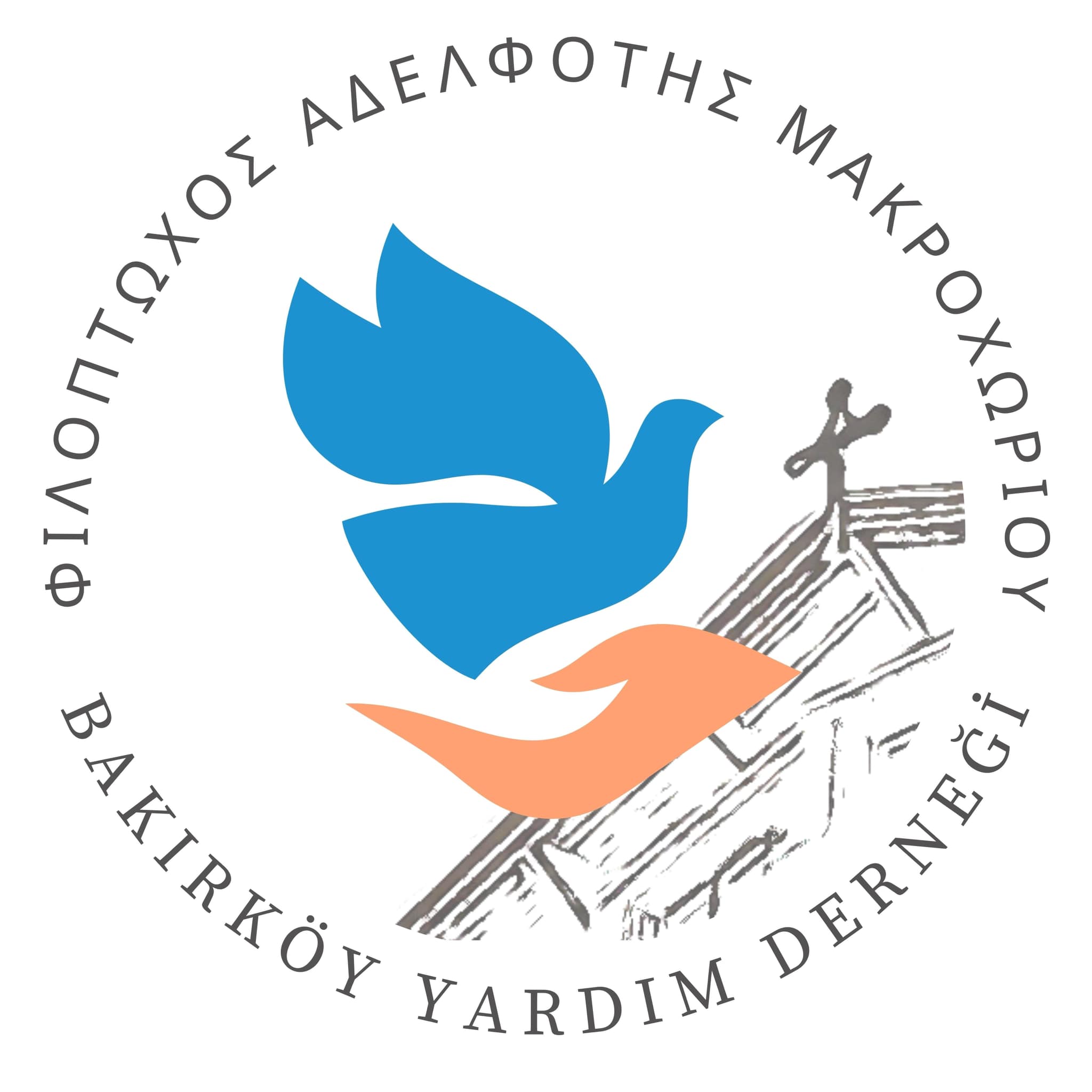Kyriakos the Hermit of Palestine (29 September)
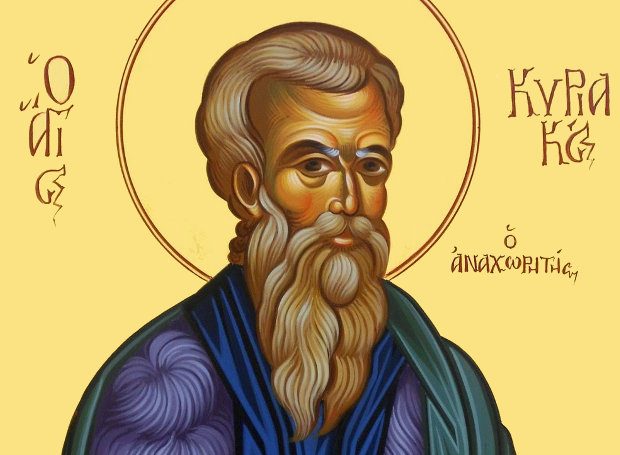

Saint Kyriákos1 was born in the Greek city of Corinth to the priest John and his wife Eudokίa. Bishop Peter of Corinth, who was a family relative, seeing that Kyriákos was a quiet and sensible child, made him a Reader in church. His constant reading of the Holy Scriptures awakened in him a love for the Lord, and made him long for a pure and holy life.
When he was not yet eighteen years old, Kyriákos was deeply moved during a Church Service by the words of the Gospel: “If any man will come after Me, let him deny himself and take up his cross and follow Me” (Matthew 16:24). He believed that these words applied to him, so he went straight to the harbor without stopping at home, got onto a ship, and went to Jerusalem.
After visiting the holy places, Kyriákos lived for several months at a monastery not far from Sion, in obedience to the Igoumen Abba Eustórgios. Later, with the latter’s blessing, he made his way to the wilderness Lavra of Saint Euthymios the Great (January 20). Saint Euthymios, discerning great gifts of God in Kyriákos, tonsured him into the monastic schema and placed him under the guidance of Saint Gerásimos (March 4), who trained him in asceticism at the Monastery of Saint Theóktistos by the Jordan.
Saint Gerásimos, taking into account the fact that Kyriákos was very young, ordered him to live in a cenobitic monastery with the brethren. The young monk easily fulfilled his monastic obediences: he prayed fervently, he slept little, and ate food only every other day, sustaining himself with bread and water.
It was customary for the monks to go into the Rouva wilderness during Great Lent, and return to the Monastery on Palm Sunday. Seeing the young monk’s strict abstinence, Saint Gerásimos decided to take him along with him. In complete solitude, the ascetics redoubled their efforts. Every Sunday Saint Gerásimos imparted the Holy Mysteries to his disciple.
After the repose of Saint Gerásimos, the twenty-seven-year-old Kyriákos returned to the Lavra of Saint Euthymios, who was no longer among the living. Father Kyriákos asked for a solitary cell and there he devoted himself to ascetical contests in silence, speaking only to the monk Thomas. But Thomas was sent to Alexandria where he was consecrated as a bishop, and Saint Kyriákos spent another ten years in complete silence. At the age of thirty-seven, he was ordained to the diaconate.
When a rift occurred between the monasteries of Saint Euthymios and Saint Theóktistos, Saint Kyriákos withdrew to the Souka Monastery of Saint Kharίton (September 28). At this Monastery they received even tonsured monks as novices, and Saint Kyriákos was also received this way. He toiled humbly at various monastic obediences. After several years, Saint Kyriákos was ordained as a priest, and was chosen as the canonarch,2 serving in this obedience for eighteen years. In all, Saint Kyriákos spent thirty years at the Monastery of Saint Kharίton (September 28).
Strict fasting and a complete lack of evil distinguished Saint Kyriákos even among the older ascetics of the Lavra. Each night he read the Psalter in his cell, interrupting his reading only to go to church at midnight. The ascetic slept very little. When he reached the age of seventy, Kyriákos went to the Natoufa wilderness, taking his disciple John with him.
In the desert the hermits ate only with bitter herbs, which were made edible by the prayers of Saint Kyriákos. After five years, a certain man found out about the ascetics and brought his demon-possessed son to them, and Saint Kyriákos healed him. From that time, many people began coming to him with their needs, but he desired complete solitude, and fled to the Rouva wilderness, where he dwelt five years more. But the sick and those afflicted by demons also came to him in that wilderness, and the Saint healed them all with the Sign of the Cross and anointing them with oil.
In his eightieth year Saint Kyriákos fled to the remote Sousakim wilderness, near two dried up streams. According to Tradition, the holy Prophet David mentioned Sousakim: “Thou hast dried up the rivers of Etham” (Psalm 73/74:15). After seven years, brethren of the Souka Monastery came to him, beseeching his spiritual help during a period of debilitating hunger and illness, which God allowed. They implored Saint Kyriákos to return to the Monastery, and he settled in the cave where Saint Kharίton had once lived.
Saint Kyriákos provided great help to the Church in the struggle with the spreading heresy of Origenism. By prayer and by word, he brought the wayward back to the true path, and strengthened the Orthodox in their faith. Cyril, the author of the Life of Saint Kyriákos, and a monk of the Lavra of Saint Euthymios, was a witness when Saint Kyriákos foretold the impending death of the chief heretics Nonos and Leontius, and said that soon the heresy would cease to spread.
The Most Holy Theotokos once appeared to Saint Kyriákos in a dream, along with Saints John the Baptist and John the Theologian, ordering him to preserve Orthodox doctrine in its purity. She refused to enter his cell, however, because in it was a book with the writings of the heretic Nestorius. “My enemy is in your cell,” she told him.3
At the age of ninety-nine, Saint Kyriákos went to Susakim again and lived there with his disciple John. In the desert, Saint Kyriákos was served by a huge lion, which protected him from robbers. The animal did not bother the brethren, and it ate food from the Saint’s hand.
The ascetics had stored some water in the hollow of a rock during the winter, but in the heat of summer, all the water dried up. Since there was no other source of water, Saint Kyriákos prayed, and the rain fell, filling the hollow with water.
Saint Kyriákos returned to the Monastery two years before his death and settled once more in Saint Kharίton’s cave. Until the end of his life the righteous Elder preserved his courage, and prayed with fervor. He was never idle, he either prayed or he worked. Before his blessed repose, Saint Kyriákos summoned the brethren and blessed them all. He fell asleep in the Lord, having lived for 109 years.
1 His name is derived from the Greek word Κύριος, which means Lord, or one who belongs to the Lord.
2 A Canonarch is the lead chanter, or Reader. He ensures that other Readers chant from the correct texts and use the proper Tones. He also preserves the canonical order in the liturgical services, according to the Typikon.
3 The appearance of the Most Holy Theotokos to Saint Kyriákos is commemorated on June 8.
This Saint was born in Corinth in 448. He went to Palestine to the Lavra of Euthymius the Great, but because of his youth was sent by Saint Euthymius to Saint Gerasimus; after the death of Saint Gerasimus he returned to the Lavra of Saint Euthymius. Later he took on a more rigorous life of asceticism in the wilderness of Natoufa, where there was nothing to eat except the exceedingly bitter wild herb called squills, which, however, through his prayers, God made sweet for him and his disciple. He lived 107 years and reposed in the year 555.
Cyriacus was born in Corinth, to John and Eudoxia. His father John was a presbyter and Peter, Bishop of Corinth, was his kinsman. In his early youth, the bishop ordained Cyriacus a reader in the cathedral church. Reading the Holy Scripture, the young Cyriacus marveled at God’s providence: how God glorified all His true servants and how He arranged the salvation of the human race. At age eighteen, Cyriacus’s desire for the spiritual life led him to Jerusalem. There, he entered the monastery of a godly man Eustorgius, who gave him his first instruction in the monastic life. After that, he went to St. Euthymius, who foresaw that he would be a great spiritual father. He clothed him in the schema and sent him to St. Gerasimus at the Jordan, where Cyriacus spent nine years. Following the death of Gerasimus, he returned to the Monastery of St. Euthymius, where he remained in stillness for ten years.
Then, fleeing the praise of men, he moved from place to place. He finally lived a life of asceticism in the community of St. Chariton, where he ended his earthly sojourn of 109 years. A celebrated ascetic and miracle-worker, St. Cyriacus was massive and strong in body, and remained such in deep old age, despite strict fasts and vigils. In the wilderness, he sometimes ate only raw greens for years. He was very zealous for the Orthodox Faith, denouncing all heresies, especially that of Origen. He said of himself that, since he became a monk, the sun had neither seen him eat nor become angry with anyone. According to the Rule of St. Chariton, the monks ate only once a day, after the setting of the sun. Cyriacus was a great light, a pillar of Orthodoxy, the adornment of monks, a mighty healer of the sick, and a gentle comforter of the sorrowful. Having lived long for the benefit of many, he took up his habitation in the eternal joy of his Lord in the year 557 A.D.
Apolytikion of Cyriacus the Anchorite
First Tone
Thou didst prove to be a citizen of the desert, an angel in the flesh, and a wonderworker, O Cyriacus, our God-bearing Father. By fasting, vigil, and prayer thou didst obtain heavenly gifts, and thou healest the sick and the souls of them that have recourse to thee with faith. Glory to Him that hath given thee strength. Glory to Him that hath crowned thee. Glory to Him that worketh healings for all through thee.
Kontakion of Cyriacus the Anchorite
Plagal of the Fourth Tone
The sacred lavra doth at all times rightly honour thee as a sure helper and support and mighty champion, and it annually observeth thy holy mem’ry. And since thou, O righteous Cyriacus, dost possess boldness with the Lord, protect us from our enemies, that we may cry to thee: Rejoice, O thrice-blessed Father.
Source: oca.org / goarch.org / westserbdio.org

